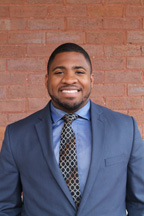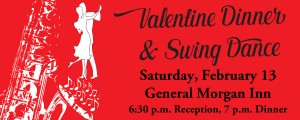Ancient Jewish sect connected to the Dead Sea Scrolls the focus of second Theologian-in-Residence lecture
The Essenes, an ancient Jewish sect believed by scholars to be the group who wrote the Dead Sea Scrolls, were the topic of the second session of the Theologian-in-Residence lecture series at Tusculum College.
Dr. Travis Williams, assistant professor of religion at Tusculum, is presenting a series of lectures, “The Dead Sea Scrolls and the Bible: Identifying, Altering and Preserving Scripture in Antiquity” as part of the annual series sponsored by Tusculum College and partially funded by Ron Smith.
The focus of Williams’ presentation was examining what the archeological evidence and the text found in the scrolls themselves tell about the group that lived at the settlement at Qumran near the caves where the scrolls were found, as well as identify who wrote and took measures to preserve the more than 900 ancient texts that have been discovered in an arid area near the Dead Sea.
From the archeological findings at Qumran it can be concluded that a group of approximately 150-200 people lived in the settlement and that group was likely Jewish as there is a clear concern for ritual purity, Dr. Williams said. In addition, writing and copying of documents was important to this group.
The next question he addressed is whether the people living at Qumran are connected to the Dead Sea Scrolls. “If we determine who wrote the scrolls, and if we can connect the scrolls to the settlement, it can be one of the pieces needed to understand the texts better,” he said.
Excavations at Qumran were initially supervised by a French Dominican priest, Roland De Vaux, who proposed that the settlement, which housed between 150-200 people, was occupied from around 135 B.C. to 68 C.E. with the exception of a period between 31 B.C. and 4 B.C. when it was abandoned after an earthquake.
However, Dr. Williams noted, scholarly views regarding the timeline of the occupation of Qumran have changed. Jodi Magness, who is the major authority on archeology at Qumran in recent times, has proposed a timeline that is now more widely accepted. In Magness’ timeline, Qumran was established sometime between 100 – 50 B.C. and was continuously occupied until 68 C.E. when the settlement is believed to have been destroyed by the Romans.
Some of the interesting finds at the site are a large dining hall, a scriptorium and several stepped pools, Dr. Williams said. The dining hall is the largest room at Qumran and archaeologists believe it to have been used for a communal meals because of the dishes found in an adjacent room, he continued.
The scriptorium was a room dedicated to writing and copying manuscripts and may have been where the parchments for the scrolls were prepared as evidenced by narrow tables well suited for writing and ink wells discovered inside.
Seven to 10 stepped pools around the settlement have also been the subject of debate, Williams noted. Some scholars have theorized that they were cisterns to collect rainwater. However, most scholars believe they are pools to be used for purification as some have steps with partitions that indicate a concern for ritual separation.
While there are alternate views that Qumran was either a wealthy villa or a pottery factory, the consensus view among most scholars is that the settlement was a communal building for a Jewish sectarian group, Dr. Williams continued.
The proximity of the caves to the settlement, the discovery of the same style of pottery jars in the caves and the settlement, as well as the ink used to write the scrolls all provide proofs that the scrolls and Qumran are connected, he said.
Very soon after the discovery of the scrolls, people began connecting them with the Jewish Essene movement, Dr. Williams noted, and the Essene hypothesis has since been the majority opinion of scholars.
The discovery of such things as phylacteries containing scripture, clothing fragments of white linen, and the geographical location of the settlement all match what is known of the Essenes’ strictness and focus on ritual purity from writings of historians and scholars of the period.
Texts within the scrolls themselves also reflect theological emphases which connect them with beliefs that are attributed to the Essenes, Dr. Williams said, such as a belief that man does not have free will but all is governed by God. The scrolls also document the same type of admission requirements that are mentioned by ancient authors describing the Essenes. To become an Essene, he said, an individual first had to enter a period of examination and testing before being accepted to the sect, a process that took about three years.
Although there is very little know about the origins of the community, Dr. Williams said, scholars believe it is connected to political upheaval in Jerusalem when the high priest was removed from office at around 100 B.C. and was replaced by a Jewish leader who helped one of the warring Greek factions battling for control of the area win the conflict. Scholars believe the Essenes are a group who separated themselves from the temple because of what they felt to be illegitimate leadership that did not meet the qualifications set forth in Judaism.
Scholars have also theorized about why the scrolls were left and it is believed that those at Qumran took the scrolls to the caves to keep them from being destroyed by the Romans.
The lecture series will continue on Tuesday, Feb. 23, when Dr. Williams will explore the fluidity of the scriptural texts found among the scrolls and also preview the phenomenon of “Rewritten Bible,” in which a work closely reproduces a biblical book but modifies it by means of addition, omission, paraphrase, rearrangement or other types of changes. Due to postponement of an earlier lecture this month due to inclement weather, the series’ concluding session will be Tuesday, March 8.
The lecture session will begin at 10 a.m. in the Chalmers Conference Center in the Niswonger Commons. The session will conclude around 1:30 p.m., and lunch in the college’s cafeteria is included. Although there is no admission fee to attend the lectures, reservations are required. For more information or to make a reservation for the series, please call 423-636-7304 or email eestes@tusculum.edu.
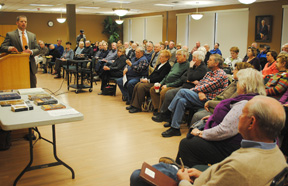
Dr. Travis Williams answers a question about the archeological discoveries at Qumran during the second session of the Theologian-in-Residence lecture series.
‘The Odd Couple’ opening at Tusculum on Friday, Feb. 26
Laughter is in the forecast at Tusculum College as “The Odd Couple” opens on Friday, Feb. 26.
Theatre-at-Tusculum is presenting Neil Simon’s award-winning play for two weekends beginning Feb. 26. The production, directed by Marilyn duBrisk, will be in the David Behan Arena Theatre (side entrance) in the Annie Hogan Byrd Fine Arts Building on the Tusculum campus. Performances are 7 p.m. Feb. 26-27 and March 3-5, as well as 2 p.m. Sunday matinees on Feb. 28 and March 6.
The comedy follows the lives of two distinctly different best friends, Oscar Madison and Felix Unger. The tightly wound, hypochondriac Felix, played by Brian Ricker, is forced to move in with the slovenly and brash Oscar, played by Chris Greene. Hilarity ensues as they try to make peace with their opposing personalities. They are supported by their poker buddies: Murray, played by Will Maddux, Vinnie, played by Parker Bunch; Speed, played by Chris Sutton, and Roy, played by Josh Beddingfield.
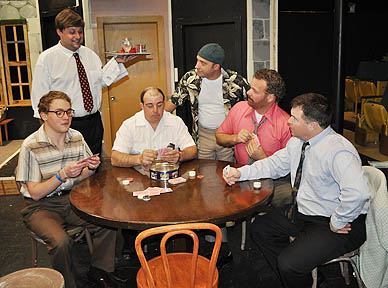
Oscar and his poker buddies try to become accustomed to Felix and his neurotic ways during this scene from “The Odd Couple.” The comedy opens Friday, Feb. 26 at Tusculum College. From left are Parker Bunch as Vinnie, Brian Ricker as Felix, Will Maddux as Murray, Chris Greene as Oscar, Chris Sutton as Speed and Josh Beddingfield as Roy.
Greene and Ricker were last seen on stage in Theatre-at-Tusculum’s production last fall of “Chitty Chitty Bang Bang,” with Greene as the loving father and lead character, Caractacus Potts and Ricker as the dimwitted Vulgarian spy, Goran.
Maddux may be familiar to audiences as Juror #3 in Theatre-at-Tusculum’s 2014 production of “Twelve Angry Men” or as the King of Siam in the 2010 production of “The King and I.” The youngest member of the cast, Bunch has been growing up on stage in productions portraying characters ranging from Wednesday Addams’ love interest Lucas Beineke in 2014’s “The Addams Family Musical” to Bob Cratchit in 2013’s “A Christmas Carol.” Audiences will recognize Beddingfield as the kind-hearted Mr. Coggins in “Chitty Chitty Bang Bang” and as the bride’s father, Mr. Banks in the Greeneville Theatre Guild’s inaugural production of “Father of the Bride.” Sutton who will be making his Theatre-at-Tusculum debut with this production, joins the cast all the way from Bluff City, Tennessee.
Joining the men on stage will be Oscar and Felix’s upstairs neighbors, the Pigeon sisters. The British sisters are invited to a double date and hilarity ensues. Portraying the sisters are Kendra Tarlton as Gwendolyn Pigeon and Whitney Marshall as Cecily Pigeon. Both actresses made their Theatre-at-Tusculum debut last fall in “Chitty Chitty Bang Bang” playing multiple characters.
Along with duBrisk, the production team includes Ricker as assistant director, Suzanne Greene as stage manager, Barbara Holt as costume director, Frank Mengel as technical director and Jennifer Howell as box office manager.
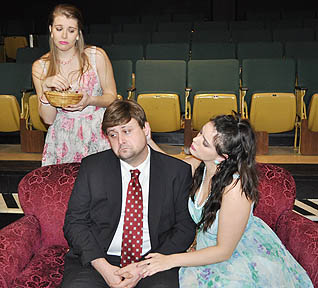
In this scene from Theatre-at-Tusculum’s production of “The Odd Couple”, the Pigeon sisters (Whitney Marshall, left, and Kendra Tarlton, right) try to comfort Felix (Brian Ricker) as they all discuss their failed marriages.
“The Odd Couple” premiered on Broadway in 1965 with Walter Matthau and Art Carney starring in the lead roles. Awarded several Tony Awards, the play was adapted for the big screen in 1968 starring Matthau and Jack Lemmon and became a popular 1970s television show featuring Jack Klugman and Tony Randall. A remake of the series premiered on CBS in February 2015 starring Matthew Perry and Thomas Lennon.
The comedy helped Simon become one of the best known American playwrights of the 20th Century. It has become culturally iconic and an American theatre staple.
The spring Theatre-at-Tusculum production is part of Tusculum College’s annual Acts, Arts, Academia Performance and Lecture series.
Admission is $15 for adults, $12 for seniors citizens (60 and over) and $5 for children (12 and under). For more information or to reserve tickets please call Tusculum College Arts Outreach at 423-798-1620 or email jhollowell@tusculum.edu.
New dates announced for lectures at Tusculum College
New dates have been set for lectures at Tusculum College. The lecture examining the political and religious rivalry between Rev. Hezekiah Balch and Rev. Samuel Doak and the lecture unveiling obscure cases from the annals of the Supreme Court have been rescheduled.
“Balch v. Doak and the Origins of Tusculum College” will take place on Wednesday, Feb. 24, at 7 p.m. in the Chalmers Conference Center at the Niswonger Commons. The “American Civil Rights and Liberties: Little Known Supreme Court Cases That Have Made a Big Impact” lecture has been rescheduled for Tuesday, March 15, at 7 p.m. at the Behan Arena Theatre in the lower level (side entrance) of the Annie Hogan Byrd Fine Arts Building on campus.
“Balch v. Doak” will be presented by Jeff Lokey, assistant professor of business administration at Tusculum College. “It’s interesting because their rivalry was transcended by Tusculum College,” said Lokey. “We haven’t forgotten it, but Tusculum doesn’t reflect that rivalry anymore.”
Balch and Doak’s animosity is historic to Greeneville. Several stories have been told detailing instances when the duo encountered each other.
As told by Richard Doughty, a former Greene County historian, “… [Balch and Doak] met one day on a plank over a particularly muddy spot. Doak was the first to speak. ‘I never make way for the devil.’ To which Balch quickly replied, ‘I do,’ and steeped aside in the mud to let Doak pass.”
While their rivalry is legendary, they both had a passion for higher education. Balch founded Greeneville College; Doak founded Washington College, formerly known as Tusculum Academy. Eventually, these two Presbyterian ministers merged their competing educational institutions to form Tusculum College.
Part of the Humanities events at Tusculum College, this will be open to the public free of charge and offered as Arts and Lectures credit for residential students.
“American Civil Rights and Liberties: Little Known Supreme Court Cases That Have Made a Big Impact” will be presented by Dr. David Scott as part of the Cicero Lecture Series and Tusculum Arts Outreach’s Acts, Arts, Academia 2015-16 performance and lecture series.
Dr. Scott, visiting instructor of political science at Tusculum, will be primarily discussing four cases that have been significant for the country during his lecture, but will also share information about other important Supreme Court decisions.
A licensed attorney, Dr. Scott earned his doctorate in political science with a focus in American politics from the University of Tennessee. He holds Juris Doctorate and Master of Dispute Resolution degrees from Pepperdine University.
His teaching and research interests include American constitutional law, civil rights and liberties, the influence of interest groups on the Supreme Court via the submission of amicus curiae briefs and political philosophy.
In his second year as an instructor at Tusculum, Dr. Scott has also taught at Carson-Newman University and Walters State Community College, as well as serving as a graduate teaching associate at the University of Tennessee at Knoxville. He and his family live in Greeneville and he serves as an elder at First Christian Church.
Admission to the lecture is $7 per person. Students, faculty and staff of Tusculum College are admitted free with a Tusculum I.D. This is also an Arts and Lecture series event for residential students.
For more information about the lecture, please contact Tusculum Arts Outreach at 423-798-1620 or jhollowell@tusculum.edu.
Learn the latest news about your fellow alumni
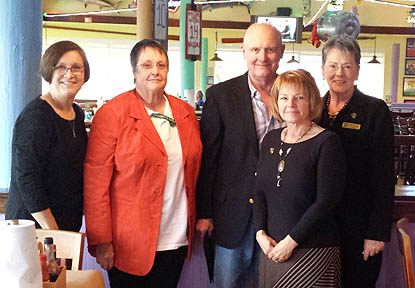
Jean Schoenthaler ’63, Louise Adams Bain ’86 and Bob Kleinertz ’76 (center) enjoyed an alumni lunch Jan. 22, 2016, at Pinchers in Fort Myers, FL. The alumni were able to get to know each other better and also visit with Tusculum President Nancy B. Moody (right) and Heather Patchett, vice president of institutional advancement (left).
’80s
Dory Wetzel Creech ’82 has retired from the Kingsport City School System and accepted a position with District to District, a new nonprofit that is building a collaborative of small school systems in Florida and Tennessee to address curriculum and instruction. Creech has served 32 years in public education and 27 of those years with the Kingsport system. At the time of her retirement, she was assistant superintendent of instruction for system. Prior to that, she served as director of accountability, was associate principal at Johnson Elementary and then assistant principal at Dobyns-Bennett High School. She has served as a special education teacher and elementary education teacher and has taught in Georgia, Louisiana and Tennessee. Creech is also active in her community. She is vice chairwoman of the executive board and the board of directors for the Greater Kingsport Family YMCA, the United Way of Kingsport Board of Directors and the Board of Examiners for the Tennessee Center for Performance Excellence.
’90s
Rick Scarborough ’96 of Clinton, TN, has been recently appointed to serve on the Executive Committee of the International Association of Chief’s of Police. Scarborough is one of 47 committee members representing the diversity of the global law enforcement community. The association serves as the professional voice of law enforcement and addresses cutting edge issues confronting law enforcement through advocacy programs and research, as well as training and other professional services. Scarborough, chief of police of the Clinton department, has served as state representative for the Tennessee Association of Chief’s of Police for the past five years at meetings of the States Association of Chiefs of Police. He is also chairing the Southern Region of that association. Scarborough recently completed an appointment to an International Association of Chief’s of Police that developed policy on how law enforcement may acquire and utilize surplus military equipment. In 2014, Scarborough was elected by his peers as the East Tennessee Chief of the year. That same year, the Clinton Police Department was recognized fro winning the Excellence in Police Services Award by the University of Tennessee Municipal Technical Advisory Service. Scarborough has 26 years in law enforcement, 20 of which have been with the City of Clinton.
Charles Robin Smith ’97 has been promoted to deputy chief of the Oak Ridge Police Department. Charles has served with the Oak Ridge Police Department since 2012. Prior to joining the Oak Ridge department, he served for 17 years with the Tennessee Valley Authority Police and the last 14 of those as commander of police operations. Charles began his law enforcement career with the Sevierville Police Department.
Stacey Linkous Jones ’98 of Wytheville, VA, began her duties as the new executive director of the Brock Hughes Free Clinic in Wytheville on Jan. 18. Previously, she was instructor with Talent Search at Wytheville Community College. In her new position, Stacey oversees the daily operation of the clinic and is responsible for the staff, continued programs, finances and administration. In addition to her degree from Tusculum, Stacey has earned a master’s degree from Capella University. An active member of Sunny Hills Community Church in Wytheville, Jones teaches the middle school class.
Rodney Reed ’98 has been promoted to senior director for SSA & COMPANY, which is a management consulting firm based in Rockefeller Plaza on 5th Avenue in New York City. In 2015, the firm was recognized as one of Consulting Magazine’s “Fastest Growing Firms” SSA & COMPANY helps companies execute on strategy for world-class performance – from fast-cycle, targeted process improvements to a total rethinking of a company’s operating model.
’00s
Regina Jennings ’00 of Maryville, TN, has joined the Pinnacle Financial Partners Blount County office as a senior vice president and financial advisor. Regina has 30 years experience and most recently worked for BB&T Corp. as a vice president and market leader for Blount County. In addition to her degree from Tusculum, she is a graduate of the Tennessee School of Banking and the Southeastern School of Commercial and Consumer Lending at Vanderbilt University.
Stanley Thompson ’03 has served six terms as assessor of property in Bradley County and is seeking his seventh term in the upcoming general election. He also serves as chairman of the Bradley County / City of Cleveland G.I.S. Board which serves to aid many city and county departments. Stanley is the past president of the Tennessee Association of Assessing Officers in which he was selected as the Tennessee Assessor of the Year for 2010 and 2013. He currently serves on the Tennessee Association of Assessing Officers Executive Board as secretary/treasurer.
Beki (Julie Rebecca) Fragomeni Elliott ’09 is serving as a numeracy coach in Knoxville.
’10s
Ron Overton ’11 ’13 has been named principal at Talbott Elementary School.
Andrew Baker ’13 is serving as guest editor for “Wuxi Life” magazine. He is also enrolled in Matador University’s Travel Writing program.
Aly Carrino ’13 has been promoted resource development and athletics director for the Boys and Girls Club of Greeneville and Greene County. In her new position, Aly will serve as one of the leaders of the club’s capital campaign to develop a new facility for the club and a sports complex area. Her responsibilities also include procuring sales from local businesses and organizations to aid the club’s special events, as well as obtaining a large majority auction items for the club’s annual Celebrity Auction. In addition to her degree from Tusculum, Aly has earned a master’s degree in recreation and sport management from the University of Tennessee. She serves on the Greene County Partnership’s Sports Council board and is a member of the 2015-16 Greene County Leadership Class. She attends Telford United Methodist Church.
Justin Phillip Reed ’13 has received a third-year fellowship and has been named the Jr. Writer-in-Residence in poetry at Washington University in St. Louis.
Robert Arrowood ’14 has been accepted into Texas Christian University’s doctoral program. He will be pursuing a doctorate in social psychology with a graduate minor in quantitative psychology. Robert is a currently a graduate student working under Dr. Ralph W. Hood, Jr. in the Psychology of Religion Lab at The University of Tennessee at Chattanooga.
Joe Borden ’14 is special projects coordinator at American Blackguard, Inc., a film, television, stage, music, event and publishing company based in Nashville. He has also been named editor of “Killer Nashville Magazine.”
Ashley Sarmiento ’14 accepted a teaching position in mathematics in Nashville.
Bridget Conte ’15 is working as a correctional officer at the Greene County Sheriff’s Office.
Kate Kolodi ’15 has just completed an artist residency at Jewell Gardens in Skagway, AK.
Corrine Elizabeth Moore ’15 is working at the Birthplace of Country Music Museum in Bristol, VA.
Briana Rose ’15 is working at the Milligan & Coleman law firm in Greeneville.
Melanie Sigman ’15 has begun graduate studies in public history at Western Georgia University.
Jo Anne Smith ’15 was accepted into and has begun the doctoral program in educational leadership at East Tennessee State University.
’30s
Elizabeth MacLeod Scattergood ’38 of Germantown, passed away Jan. 17, 2016, after battling Alzheimer’s disease. Mrs. Scattergood was a licensed social worker, specializing in children’s services for many years, before retiring in the early 1980s. Although raised a Presbyterian, she learned about the Society of Friends during her search for a faith that espoused pacifism and became a member of the 57th Street Friends Meeting in Chicago. While employed as a social worker at the Family Services Bureau in Chicago, Mrs. Scattergood found that her religious and professional lives had come together. She signed on with the American Friends Service Committee, and in 1950 went to Ludwigshafen, West Germany, where she directed a neighborhood center as part of the post-World War II relief effort. Mrs. Scattergood then transferred to Darmstadt to become administrative assistant to the Head of Germany Mission. After three years in Germany, she returned to the United States and settled in Philadelphia. In 1955, Mrs. Scattergood joined the then-new Eastern Pennsylvania Psychiatric Institute as a social work supervisor, later becoming head of the institute’s department of social services for children. She collaborated with Henri Parens on the 1977 book, “Aggression in Our Children.” The pair taught parenting skills to groups of new mothers – an effort that resulted in a curriculum for which Mrs. Scattergood wrote the lesson plans. In 1988, she and her husband moved to an assisted living facility, where she organized a Sunday interfaith discussion group for residents unable to attend regular church services. She enjoyed reading, writing, working on social and political issues and traveling.
’40s
Frances McClanahan Brockman ’49 of Kingsport, TN, passed away on February 4, 2016. A lover of nature and animals, she majored in biology at Tusculum. She maintained lifelong friendships with many of her classmates, especially her beloved husband, Dick, whom she met on a double date with her roommate. The two were married shortly after graduation in 1949 and established their home in Kingsport, where he had been raised. Busy years followed, raising four children and a move to Cincinnati for her husband’s job. Although Mrs. Brockman had not been eager to leave Tennessee, she soon grew fond of her new city and made a number of lasting friends there. The couple returned to Kingsport after seven years and remained for the rest of their lives. Mrs. Brockman found pleasure in travel, cooking, reading, music and gardening, with a special talent for creating beautiful flowerbeds from tiny cuttings. She was happiest, however, spending time with her children and extended family. Her easy laugh, outgoing personality and continual interest in learning made her a ready companion for bridge, travel and theater. Mrs. Brockman was an active member of First Broad Street United Methodist Church, the Greer Memorial Sunday School Class, United Methodist Women, and multiple choirs. She also participated in numerous local clubs and civic organizations, including the Kingsport Garden Club and Kingsport Music Club. Her strong faith and equally strong will helped her remain independent for most of her life. When heart disease and memory loss began taking their toll, she moved to Baysmont and later to Steadman Hill as her illness progressed. In lieu of flowers, to honor her memory, her family has asked that people consider making a gift to Tusculum in her honor.
’90s
Charles W. “Chuck” Irwin ’93 of Clinton, TN, passed away October 21, 2015. Mr. Irwin was a self-employed title abstractor, worked for Tennessee Bonding Company and served as high school football official for the Clinch Valley Association. He enjoyed spending time on Norris Lake on his houseboat with family and friends.
Meet new football coach at Feb. 27 alumni event
Construction continues on Ronald H. and Verna June Meen Center for Science and Math
The sound of hammering and sawing resonates at Tusculum College with the continued construction of the Ronald H. and Verna June Meen Center for Science and Math. Beginning next week, the exterior brick will begin showing and the concrete will be poured for the lecture hall.
“Most exterior walls are framed and have sheathing on them,” said David Martin, director of facilities. “I would estimate them to be 85 percent complete.”
Footing and columns have been added. Mechanical, electrical, plumbing and fire protection work continues overhead. Air barriers are ready for window installation when windows are delivered this month, added Martin
“Interior framing is about 60 percent complete, and the roofing structure will be complete by Monday, with the exception of one of the stairsways. The downspout gutters are tied into the storm system so the roof drains flow on the east side, keeping the building relatively dry,” he said.
Panels for the main electrical room will be set in the next few weeks, as well as concrete for the transformer pad.
The Meen Center for Science and Math will be a four-story structure of approximately 100,000 square feet. Interiors include wings for biology, chemistry, mathematics, computer science and environmental science. There will also be lab space and research areas for both faculty and students.
The ground floor features the environmental science wing with a loading dock, as well as large general classroom spaces and classrooms equipped for distance learning programs. A large lecture hall will be included on the ground floor. Space is also allocated to house the Bachelor of Science degree program in nursing and at least one other graduate level health-related program.
Tusculum College contractor wins world championship
Tony Shelton of Creative Masonry is the “Toughest Tender” in the world. Shelton competed in the Spec Mix Bricklayer 500 World Championships this week and was named “Toughest Tender.” Shelton competed as tender, the mason’s assistant, for Fred Campbell in Las Vegas, Nev., on Wednesday, Feb. 3.
The competition included more than 20 master craftsmen from across the globe. Campbell, while not a winner this year, is a past Bricklayer champion, winning in 2013 and 2015. Campbell’s company, Creative Masonry, is the contractor for the brickwork on the Ronald H. and Verna June Meen Center for Science and Math, which is currently under construction at Tusculum College. Creative Masonry also was the brick layer for the new Walters State building in downtown Greeneville.
Shelton is a contractor in his own right, as was his father, and he owns and operates Limestone Construction.
“Tony’s the best mason I’ve ever been around, and I wish I could take him with me to every job,” said Joe Lane, superintendent for Rentenbach Constructors, contractor for the Tusculum math and science building.
The Meen Center for Science and Math will be a four-story structure of approximately 100,000 square feet. Interiors include wings for biology, chemistry, mathematics, computer science and environmental science. There will also be lab space and research areas for both faculty and students.
Campbell led the team to the world championships through regional and national competitions, and Shelton served as tender to Campbell during the main competition. In the preliminary event, the tenders raced against the clock to set up a predefined work area for the mason, and Shelton took home the top award in his category with a winning time of 15:22.
By Stephanie Turner, senior journalism and professional writing major from Shelbyville
Tusculum lecture to feature tenuous relationship of Tusculum College founders
A lecture examining the political and religious rivalry between Rev. Hezekiah Balch and Rev. Samuel Doak, founders of Tusculum College, will be presented on Wednesday, Feb. 17, at 7 p.m. in the Chalmers Conference in the Niswonger Commons by Jeff Lokey, assistant professor of business administration at Tusculum College.
“It’s interesting because their rivalry was transcended by Tusculum College,” said Lokey. “We haven’t forgotten it, but Tusculum doesn’t reflect that rivalry anymore.”
Balch’s and Doak’s animosity is historic to Greeneville. Several stories have been told detailing instances when the duo encountered each other.
As told by Richard Doughty, the late Greene County historian, “… [Balch and Doak] met one day on a plank over a particularly muddy spot. Doak was the first to speak. ‘I never make way for the devil.’ To which Balch quickly replied, ‘I do,’ and steeped aside in the mud to let Doak pass.”
While their rivalry is legendary, they both had a passion for higher education. Balch founded Greeneville College; Doak founded Washington College, formerly known as Martin Academy. Eventually, the two institutions merged to form Tusculum College.
Lokey said, “For more than 30 years, I have worked at Tusculum College, and I didn’t understand the rivalry between the two. I decided to find out what caused it.”
Part of the Tusculum College Humanities Series, the event will be open and is free of charge. For residential students, an Arts and Lectures credit is offered.
By Stephanie Turner, senior journalism and professional writing major from Shelbyville
Tusculum student receives Northwestern Mutual internship award
Northwestern Mutual has honored Tusculum College senior Kevin Jerome with its 2016 Southern Region Top Ten Intern award. The honor recognizes Jerome for an outstanding year with Northwestern Mutual, serving the financial security needs of clients and policy owners throughout the region.
“In a world of financial uncertainty, Northwestern Mutual financial experts like Kevin Jerome have helped deliver confidence to thousands of families,” says Greg Oberland, Northwestern Mutual president.
During his internship with Northwestern Mutual, Jerome, an international business and economics major from Johnson City, offered personalized solutions that helped people reduce financial vulnerability and address a lifetime of needs and goals.
Through an on-campus recruiting event, he landed the internship with Northwestern Mutual. After only a few months, he was ranked nationally as Northwestern Mutual’s seventh leading intern in productivity.
In addition to school and work, Jerome is also a volunteer with the Young Professionals of Tri-Cities, Habitat for Humanity and Pou Yi Mou’n Yo, a charitable organization for children.
After graduation in May, Jerome will join the Atlanta office of Northwestern Mutual as a full time employee.
Robin Lay, director of Career Services at Tusculum College, helped Jerome apply for his internship and said, “Kevin has the unique confidence to ask very successful people for career advice—mixed with enough humility to make him teachable—which means that he will continue to grow personally and professionally.”
Northwestern Mutual financial professionals provide a comprehensive approach to financial planning in order to help clients meet a variety of personal and business needs. Clients are able to obtain personalized financial solutions through Northwestern Mutual’s commitment to financial strength, expertise with time-tested planning principles and comprehensive approach to planning – accompanied by a financial professional’s long-term commitment to listen, guide and encourage.
Lecture series focusing on Dead Sea Scrolls begins
Dr. Travis Williams provided an overview of the more than 900 texts that are part of the Dead Sea Scrolls and detailed the story of the extraordinary discovery of the ancient writings and their lengthy journey to publication during the first session of the annual Theologian-in-Residence lecture series Tuesday at Tusculum College.
Dr. Williams, assistant professor of religion at Tusculum, is presenting a series of lectures, “The Dead Sea Scrolls and the Bible: Identifying, Altering and Preserving Scripture in Antiquity” as part of the annual series during February sponsored by Tusculum College and partially funded by Ron Smith.
“The Dead Sea Scrolls have profoundly shaped our understanding of ancient Judaism and early Christianity and changed the way we view both,” Dr. Williams said.
The scrolls are the oldest copies of Jewish scripture that have been found and have revealed that the Hebrew scriptures were fluid at the time of Jesus, he continued, explaining that the Jewish scriptures and what make up the books of the Old Testament in Christian Bibles were standardized at around 1000 C.E.
The Dead Sea Scrolls also provide new insights on various sects within Judaism at the time, particularly the Essenes, and provide insights into theological ideas at the time of Jesus and early Christianity, Dr. Williams said.
What are referred to as the Dead Sea Scroll is a group of more than 900 texts from what is believed to be a community of the Jewish sect of the Essenes. The scrolls date from the Third Century B.C.E.to the First Century C.E., which were discovered at Qumran, an ancient site on the northwest shore of the Dead Sea.
There are four types of documents that have been found among the scrolls – about 25 percent of copies of Jewish scriptures (books that are included in the Old Testament in the Bible), about 27 percent are compositions that were common to Judaism in First Century in Palestine, about 38 percent are sectarian texts describing the beliefs and practices of the Essenes and 11 percent are too fragmentary to be identified.
The sectarian texts also include a book of hymns similar to the book of Psalms in the Bible, apocalyptic writings and commentaries on the Jewish scriptures. “Some of these sectarian documents were just important to them as what we consider the Bible,” Dr. Williams said. “Their Bible was much bigger if you will.”
For example, he said, many more copies of the books of I Enoch and Jubilees were found than some of Biblical books, suggesting that these sectarian books were more important and held more authority for the Essenes, he continued. The scrolls have also revealed that the Essenes were conservative in their beliefs, were stringent in their observance of purity law and were in conflict with the temple authorities in Jerusalem.
About 80 percent of the scrolls were written in Hebrew, 17 percent are in Aramaic and three percent are in Greek. The texts themselves were written on parchment, papyrus, pieces of broken pottery and copper. The copper scroll is one of the most interesting of the texts, as what appears to be a treasure map was engraved in Hebrew on the copper, telling the location of various hiding places of what calculates to between 58-174 tons of silver and gold. Dr. Williams said that many scholars think that the map may be a fake and other scholars have argued that it may detail places the treasury from the temple at Jerusalem was hidden from the Romans.

Dr. Travis Williams, assistant professor of religion at Tusculum College, answers questions from the audience during the first session of the annual Theologian-in-Residence lecture series.
The first scrolls were found either in late 1946 or early 1947 as the accounts of the Bedouin shepherds who are credited with making the initial discovery differ, Dr. Williams noted. The initial find was seven scrolls in either one or two caves, he said, and the scrolls were sold to a Syrian archbishop, Mar Samuel, and an Israeli scholar, Eliezer Sukenik. On the day that the United Nations passed the resolution creating the nation of Israel, Sukenik was reading the scroll texts when he heard the announcement on the radio. “In his diary, Sukenik noted that he was reading a scroll written 2,000 years ago, the last time that Israel was a free state and now it was a free state again,” Williams said.
Mar Samuel moved to New Jersey and took the scrolls he had purchased with him and advertised them for sale in the Wall Street Journal, an advertisement brought to the attention of Sukenik’s son who was lecturing in the United States at the time, bringing the original scrolls back together for display in the “Shrine of the Book,” a section of the Israel Museum in Jerusalem that was specifically built to house the Dead Sea Scrolls.
In the meantime, the growing knowledge of the valuable nature of the scrolls led to a race between the Bedouin and archeologists to discover if more scrolls were in the area. Both groups made discoveries of a total of 11 caves in the Qumran area containing scrolls. The biggest find was in what is known as Cave Four, which contained about 500 texts.
With the size of the finds by the Bedouin and archeologists, an international team of scholars was assembled to reconstruct the texts from the thousands of fragments found and translate them.
A long delay in publication of the Dead Sea Scrolls led to controversy and conspiracy theories that things were being hidden from the public by the authorities. However, Dr. Williams said, the reason for the delay is mundane when compared to some of the conspiracy theories.
A combination of factors led to the delay, he noted. The number of scholars assembled to accomplish the task of reconstructing and translating the scrolls was too small for the size of the project, and many of the texts being translated were new to the scholars.
In addition, the scholars’ only compensation for their work on the scrolls was either from books they wrote about the scrolls or academic positions they might acquire because of the work, Dr. Williams continued, thus the scholars were hesitant to share their work through a desire to become an expert on their part of the project.
No one was given access to the scrolls until after a college professor and one of his students in the 1980s was able to construct the text of the scrolls from one of the concordances of scroll texts that had been provided to a few universities over the years and published it. After this publication, microfilm photographs of many of the scrolls were found in the Huntington (Calif.) Library, and the director provided access to these to qualified scholars. The photographs had been given to the library from an individual who had provided funding for the Dead Sea Scrolls project and had received them in return. After this, the authorities gave access to the scrolls and they can now be accessed digitally through the Internet.
Lecture sessions are on each Tuesday in February. The lecture session will begin at 10 a.m. in the Chalmers Conference Center in the Niswonger Commons. The session will conclude around 1:30 p.m., and lunch in the college’s cafeteria is included. Although there is no admission fee to attend the lectures, reservations are required. For more information or to make a reservation for the series, please call 423-636-7304 or email eestes@tusculum.edu.
Any make-up sessions scheduled due to cancellation of the lecture series due to inclement weather will be announced at a later date.
Click here for additional resources about the Dead Sea Scrolls and slides from Dr. Williams’ presentation
Celebrate Valentine’s Day with dinner and dancing and support the Tusculum College band program
Dinner, dancing and romance are on the agenda for the Valentine’s Day Dinner/Swing Dance, set for Saturday, Feb. 13 at 6:30 p.m., at the General Morgan Inn.
The evening event includes a reception, free dance lessons and a steak and shrimp dinner. Following dancing, a special dessert course will be served. Providing the music will be the Tusculum College Pioneer Jazz Band, along with special guests.
“When we decided to do a fundraiser for the band program, we were looking for a way to also provide entertainment to the Greeneville community,” said David Price, director of music at Tusculum College. “Spending a night dancing and eating good food with your sweetheart is what Valentine’s Day is all about.”
For anyone interested in honing skills for the dance floor, basic swing dance instruction will be offered immediately prior to the event from 6-6:45 p.m. by Dr. Bob and Christine Thorpe. The Thorpes have participated and competed in dance events across the southeastern United States for more than 20 years.
The Thorpes have been dancing together for 20 years and seize every opportunity to attend workshops, competitions and dance events from Pittsburgh to Cincinnati
and all over the southeastern US. They have taken private instruction in many styles of dance including Ballroom East and West Coast Swing, Waltz, Foxtrot, Carolina Shag and Latin Rumba, Cha-Cha and Tango.
Ticket prices for the event are $50 per person and include dance tickets, free dance lessons, an opening reception, dinner and a special dessert. Please call in advance to request a vegetarian substitution. A cash bar will be available.
Tickets are available for purchase at the General Morgan Inn or by contacting Price at 423-636-7303 or emailing daprice@tusculum.edu. A hotel package special is also available by contacting the General Morgan Inn at 423-787-1000.
Special table reservations are available for larger group seating by contacting Price.
The Pioneer Band Program at Tusculum College began in 2010, with the creation of the Pioneer Pep Band. The Pep Band became a much-enjoyed feature of the 2010 Pioneer football and basketball seasons, as the band performed at the Pioneer Club tailgate parties before each home football game and during pregame and half-time festivities.
Since that time a concert band, jazz band, marching band, handbell choir and several small ensembles have been added to the program. The groups play several events on campus each year, as well as events in the community.








